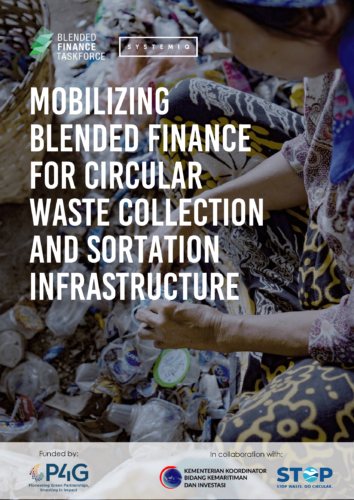Across the world more than two billion people are without access to effective waste management systems. A lack of investment in the sector has resulted in inefficient waste management, which is the third largest source of global Greenhouse Gas (GHG) emissions.
With global waste production expected to grow by over 1 billion tonnes by 2050, this funding gap poses a major threat to human and planetary health.
How can we make waste management systems more attractive to investors and unlock the finance needed to drive large-scale transformation?
A new paper by Systemiq sets out a model for investible waste management systems in Indonesia – the third largest GHG emitter in the waste sector globally – which could be replicated in countries across the globe that are facing similar challenges.
Titled Mobilising Blended Finance into Circular Waste Collection and Sortation Infrastructure, the whitepaper draws from insights and contributions from industry experts, as well as Systemiq’s extensive experience in the region. This includes through its Project STOP programme, which works with the Indonesian government and other key stakeholders to build comprehensive, economically sustainable waste management systems that follow the circular economy principles.
The paper was developed in partnership with Indonesia’s Coordinating Ministry of Maritime Affairs and Investment (CMMAI) and supported by Partnering for Green Growth and the Global Goals 2030 (P4G).
Key findings
- Currently, only approximately 55% of waste is collected across Indonesia and up to 120 million people lack access to waste management services across the country.
- Indonesia needs around US$4 billion in investment to increase circular waste to a sufficient level, and that gap cannot be filled by philanthropic funds alone.
- A blended finance framework, funded through a range of public and private actors, could help professionalise waste collection systems and make them more attractive to investors.
- The ambition should be to switch to a utility-type business model, funded by blended finance and supported by local and national government actions, which would use concessionary finance to attract commercial capital into the waste management sector. This model would be underpinned by ongoing waste service fees.
The blended finance study presents priority actions for key stakeholders across the waste management value chain and infrastructure financing ecosystem, and outlines the systemic changes required to unlock capital and build a pathway into beyond-grant models.
To learn more about Project STOP, visit www.stopoceanplastics.com. If you would like to learn more about the blended finance whitepaper, contact Eric Chocat.


